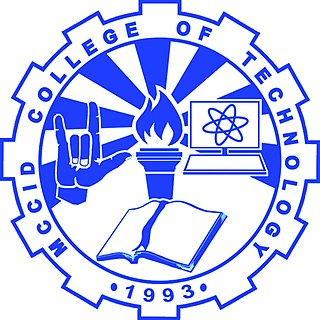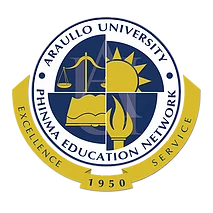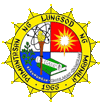The Xavier University – Ateneo de Cagayan, also known simply as the Ateneo de Cagayan or Xavier is a private, Catholic, coeducational, basic and higher education institution. It is operated by the Philippine Province of the Society of Jesus in Cagayan de Oro, Misamis Oriental, Philippines. Founded in 1933 as the Ateneo de Cagayan, it became the first higher education institution in Mindanao to receive a university status a year before its sister school Ateneo de Manila. It was given its present name in honor of the Jesuit missionary St. Francis Xavier.

Cebu Doctors' University, also referred to by its acronym CDU and colloquially Cebu Doc, is a private nonsectarian coeducational higher education institution located in Mandaue City, Cebu, Philippines. It was founded in 1973 at Cebu City as Cebu Doctors' College (CDC), the school was formally renamed in 2005 as Cebu Doctors' University (CDU). It is organized into eight colleges, a Graduate school, and as of 2016, a Senior High school.

The University of the Philippines Open University(UPOU) is a public research university and is the fifth constituent university of the University of the Philippines System. The majority of UPOU students are based in the Philippines but all of its programs can be taken anywhere in the world. While primarily a virtual university, it has a physical campus that houses admin and faculty offices in Los Baños, Laguna, with Mega Learning Hubs (MLH) in Manila and Cebu.

Manila Christian Computer Institute for the Deaf (MCCID) is a non-sectarian, post-secondary, Christian foundation school for the deaf in the Philippines authorized by the Technical Education and Skills Development Authority (TESDA) to offer non-degree computer and other technical training programs.

Araullo University, also referred to by its acronym "AU " or simply "Araullo", is a private, non-sectarian secondary and higher education institution in Cabanatuan, Nueva Ecija, Philippines. It was established in 1950. The university offers a wide range of secondary, undergraduate and graduate programs in its three campuses.

The Department of Education is the executive department of the Philippine government responsible for ensuring access to, promoting equity in, and improving the quality of basic education. It is the main agency tasked to manage and govern the Philippine system of basic education. It is the chief formulator of Philippine education policy and responsible for the Philippine primary and secondary school systems. It has its headquarters at the DepEd Complex in Meralco Avenue, Pasig.

The Open University of the Pamantasan ng Lungsod ng Maynila (PLM) or University of the City of Manila headquartered at the Gusaling Don Pepe Atienza at Intramuros, Manila, has operated a continuing education program for working adults and professionals in its partner institutions and agencies in and out of the country. It is designed to provide higher education and improved qualifications to individuals who are unable to take advantage of traditional modes of education because of personal and professional responsibilities. Open University offers undergraduate and postgraduate degree programs.
Education in the Philippines is compulsory at the basic education level, composed of kindergarten, elementary school, junior high school, and senior high school. The educational system is managed by three government agencies by level of education: the Department of Education (DepEd) for basic education; the Commission on Higher Education (CHED) for higher education; and the Technical Education and Skills Development Authority (TESDA) for technical and vocational education. Public education is funded by the national government.

The Technical Education and Skills Development Authority serves as the Philippines' Technical Vocational Education and Training (TVET) authority. As a government agency, TESDA is tasked to both manage and supervise the Philippines' Technical Education and Skills Development (TESD). Its goals are to develop the Filipino workforce with "world-class competence and positive work values" and to provide quality technical-educational and skills development through its direction, policies, and programs.
Asian Institute for Distance Education (AIDE) is a distance learning college accredited by the Commission on Higher Education (CHED), the government agency regulating all universities and colleges in the Philippines.
The University of Southern Philippines Foundation (USPF) is a private, non-sectarian university in Cebu City, Philippines.
Golden Link College is an institution established by the Theosophical Society in the Philippines and the Theosophical Order of Service Foundation Philippines. It is located in the northern part of Caloocan, Philippines. As of 2009, it offers courses from preschool, elementary, secondary up to collegiate levels. It is a non-profit, non-sectarian college set up as foundation.

The Davao del Norte State College is a public college in New Visayas, Panabo City, Philippines which provides instruction and progressive leadership in education, engineering, arts, sciences, fisheries, and other fields.
The Angeles University Foundation also referred to by its acronym AUF, is a private Roman Catholic non-stock, non-profit educational institution run by lay persons in Angeles City. It was established on May 25, 1962, by Agustin P. Angeles, Barbara Yap-Angeles, and their family.

Established in 2000, Manila Business College is duly accredited by the Commission on Higher Education of the Philippines and the Technical Education and Skills Development Authority (TESDA). It provides an international standard of business education that combines Asian and Western concept of business management and economics studies.

PMI Colleges, formerly known as Philippine Maritime Institute, is a private, non-sectarian, co-educational higher education, Maritime institution established on September 18, 1948 in Santa Cruz, Manila, Philippines where its main campus is located.
The Saint Paul University Surigao, also referred to as SPUS or SPU Surigao, is a private, Catholic basic and higher education institution run by the Sisters of Saint Paul of Chartres in Surigao City, Surigao del Norte, Philippines.
Alternative pathways in education are alternative means of obtaining educational qualifications, other than the traditional means of gaining access to or completing the required study to obtain the educational qualifications.

The Bohol Northern Star Colleges or BNSC is a private non-sectarian co-educational institution of higher learning in Ubay, Bohol, Philippines. The institution is located at barangay Poblacion near the Catholic Cemetery.
The University of Cagayan Valley (UCV) is a private, non-sectarian university located in Tuguegarao, Cagayan, Philippines. It was formerly known as Cagayan Teachers College and Cagayan Colleges Tuguegarao.













